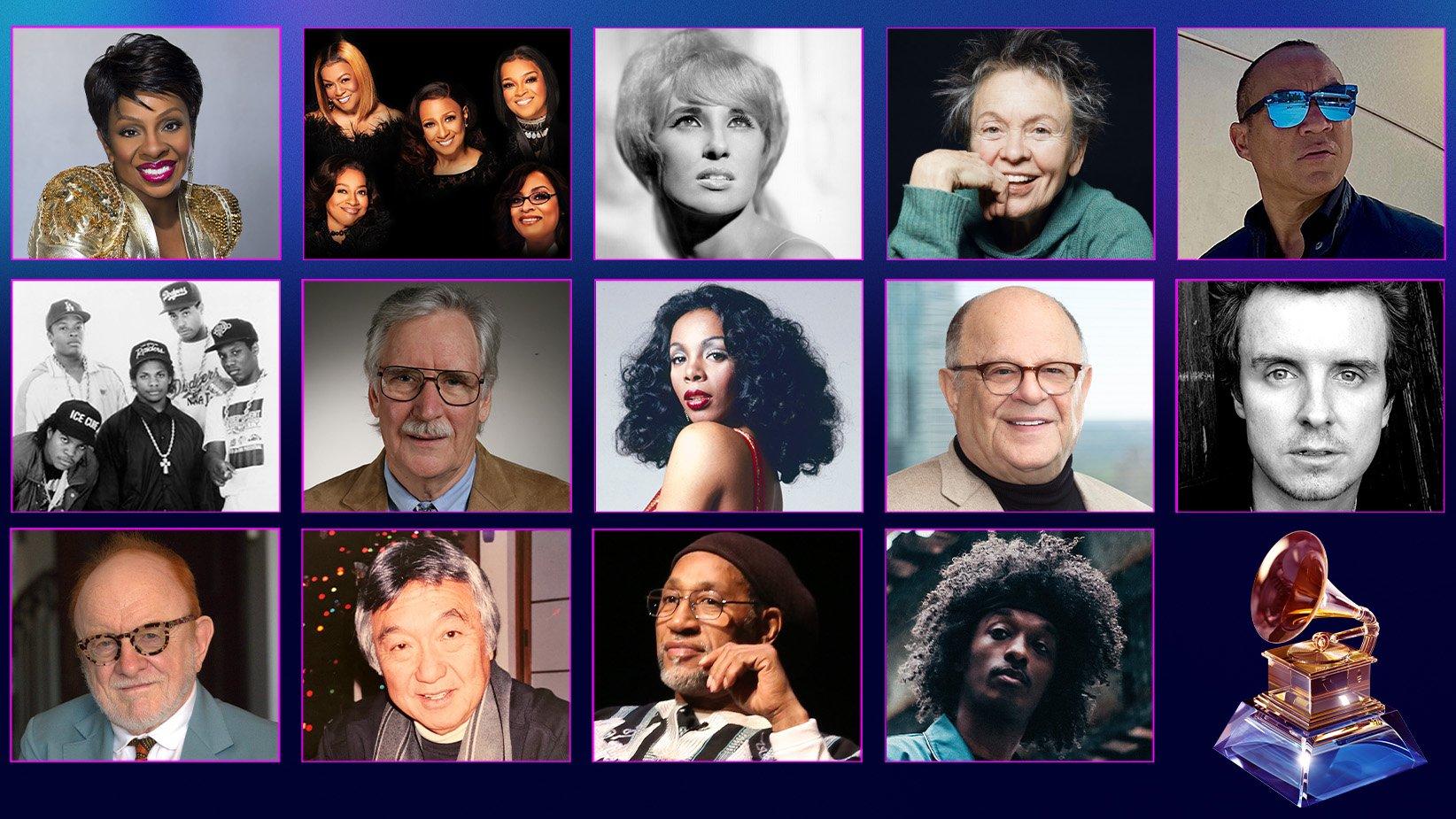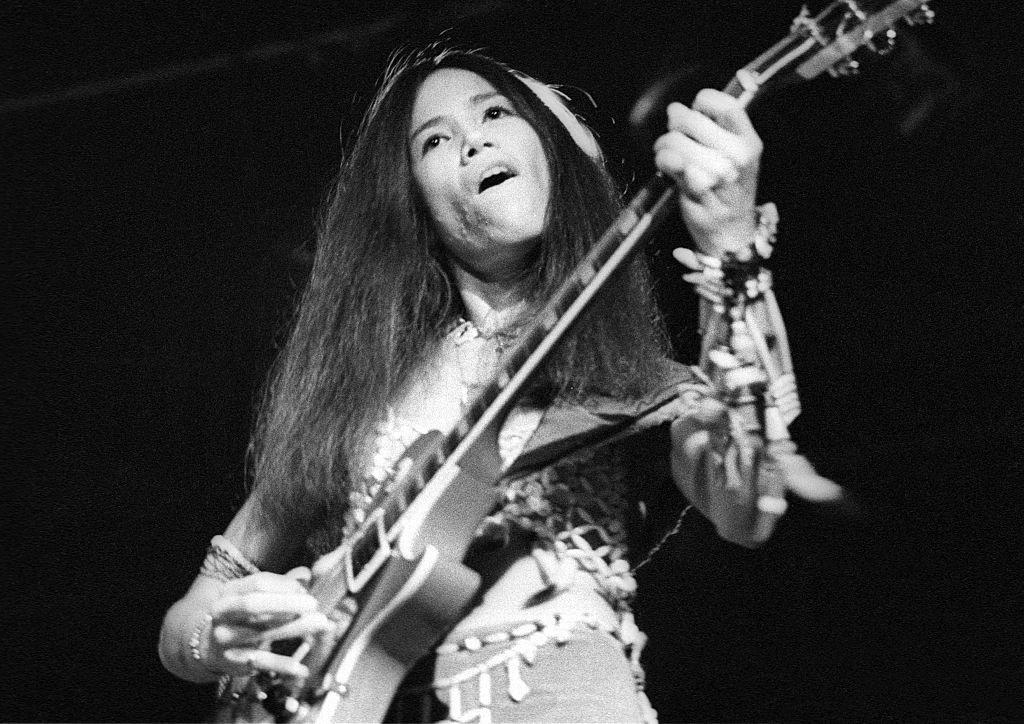Ahead of the 2024 GRAMMYs, the Recording Academy has announced the 2024 Special Merit Awards honorees.
Laurie Anderson, the Clark Sisters, Gladys Knight, N.W.A, Donna Summer, and Tammy Wynette are the 2024 Recording Academy Lifetime Achievement Award honorees; Peter Asher, DJ Kool Herc and Joel Katz are the Trustees Award recipients; Tom Kobayashi and Tom Scott are the Technical GRAMMY Award honorees; and “Refugee,” written by K’naan, Steve McEwan, and Gerald Eaton (a.k.a. Jarvis Church), is being honored with the Best Song For Social Change Award.
The Recording Academy’s Special Merit Awards Ceremony celebrating the 2023 Special Merit Award recipients will return to the Wilshire Ebell Theatre in Los Angeles on Saturday, Feb. 3.
“The Academy is honored to pay tribute to this year’s Special Merit Award recipients — a remarkable group of creators and industry professionals whose impact resonates with generations worldwide,” said Harvey Mason jr., CEO of the Recording Academy. “Their contributions to music span genres, backgrounds and crafts, reflecting the rich diversity that fuels our creative community. We look forward to honoring these music industry trailblazers next month as part of our week-long celebration leading up to Music’s Biggest Night.”
Lifetime Achievement Award Honorees
This Special Merit Award is presented by vote of the Recording Academy’s National Trustees to performers who, during their lifetimes, have made creative contributions of outstanding artistic significance to the field of recording (through 1972, recipients included non-performers).
Laurie Anderson is a writer, director, composer, visual artist, musician, and vocalist who has created groundbreaking works that span the worlds of art, theater, experimental music, and technology. As a performer and musician, she has collaborated with many people including Brian Eno, Jean-Michel Jarre, William S. Burroughs, Peter Gabriel, Robert Wilson, Christian McBride, and Philip Glass. In 2002, Anderson was appointed the first artist-in-residence of NASA which culminated in her 2004 touring solo performance, The End of the Moon. She has been nominated for six GRAMMY Awards throughout her recording career and received a GRAMMY for the release Landfall in collaboration with the Kronos Quartet at the 61st GRAMMYs.
The Clark Sisters, an American gospel vocal group initially consisting of five sisters: Jacky, Denise, Elbernita, Dorinda, and Karen – have been taking the world by storm since the early 1980s. Credited for helping to bring gospel music to the mainstream, the Clark Sisters are considered pioneers of contemporary gospel. Their biggest crossover hits include: “Is My Living in Vain?,” “Hallelujah,” “He Gave Me Nothing to Lose,” “Endow Me,” their hit song “Jesus Is A Love Song,” “Pure Gold,” “Miracle,” and their largest, mainstream crossover gold-certified, “You Brought The Sunshine.” The Clark Sisters (Jacky, Elbernita, Dorinda, and Karen) have won three GRAMMYs (two awarded to the group, and one to Karen as a songwriter for “Blessed and Highly Favored”), and with 16 albums to their credit and millions in sales, they are the highest-selling female gospel group in history.
Gladys Knight is a seven-time GRAMMY Award winner who has enjoyed No. 1 hits in pop, gospel, R&B, and adult contemporary, and has triumphed in film, television and live performance. Knight has recorded more than 38 albums over the years including four solo albums. She appeared on ABC’s 14th season of “Dancing With The Stars” in 2012, and in 2019, she competed on the inaugural season of “The Masked Singer.” Knight has sung the National Anthem at several major sporting events, including at Super Bowl LIII in Atlanta in 2019, and at the 2021 NBA All-Star Game. She was a National Endowment for the Arts 2021 National Medal of Arts Recipient and received a Kennedy Center Honor for Lifetime Artistic Achievements in 2022.
N.W.A was a rap group from the Compton district in Los Angeles who are credited by many with inventing gangsta rap. The group, consisting of Eazy-E^, Dr. Dre, Ice Cube, DJ Yella, and MC-Ren, developed a new sound, which brought in many of the loud, extreme sonic innovations of Public Enemy while adopting a self-consciously violent and dangerous lyrical stance. In 1988, N.W.A released their album, Straight Outta Compton, a brutally intense record that became an underground hit without any support from radio or MTV. This negative attention worked in their favor as it brought the album to multiplatinum status. Although the group was short-lived, gangsta rap established itself as the most popular form of hip-hop during the mid-1990s.
Donna Summer^ rocketed to international superstardom with her groundbreaking merger of R&B, soul, pop, funk, rock, disco, and avant-garde electronica, catapulting underground dance music out of the clubs of Europe and bringing it to the world. Summer holds the record with three consecutive double albums to hit No. 1 on the Billboard charts (the only solo artist to ever accomplish this), and first female artist to have four No. 1 singles in a 12-month period on Billboard’s Hot 100 chart. A five-time GRAMMY winner and 18-time GRAMMY nominee, Summer was the first artist to win the GRAMMY for Best Rock Vocal Performance, Female (1979, “Hot Stuff”) as well as the first-ever recipient of the new GRAMMY Category for Best Dance Recording (1997, “Carry On”). Summer was the first female artist to win GRAMMY Awards in four different genres: dance, gospel, rock, and R&B.
Tammy Wynette^ first hit the musical scene in 1966 with “Apartment #9” after moving to Nashville and teaming up with record producer Billy Sherrill. Together, the duo wrote songs that reflected the yearnings and the things Wynette felt were important in her life. In 1968, Wynette released “Stand By Your Man,” which sold more than five million singles and became the largest-selling single ever recorded by a female artist. By 1970, she racked up five No. 1 country hits, was named the Country Music Association’s Female Vocalist of the Year three times, and won two GRAMMYs. Wynette was the first female country music singer to sell over one million albums and has sold more than 30 million records grossing more than $100 million, earning her the title “The First Lady of Country Music.”
Read More: GRAMMY Lifetime Achievement Awards | The Complete List
Trustees Award Honorees
This Special Merit Award is presented by vote of the Recording Academy’s National Trustees to individuals who, during their careers in music, have made significant contributions, other than performance, to the field of recording (through 1983, recipients included performers).
Peter Asher’s career began in 1964 as one-half of Peter & Gordon, whose “A World Without Love” topped the charts worldwide. Nine more Top 20 hits followed before Asher became head of A&R for the Beatles’ Apple Records in 1968, and discovered, produced and managed James Taylor; later adding Linda Ronstadt, Neil Diamond, 10,000 Maniacs, Cher, Diana Ross, Kenny Loggins, Bonnie Raitt, Robin Williams, Stevie Nicks, Lyle Lovett, Morrissey, Steve Martin & Edie Brickell, Ed Sheeran, and more to his roster. Asher won the GRAMMY for Producer Of The Year in both 1977 and 1989. He hosts a hit radio show “From Me To You” on Sirius XM and is much in demand not only in the studio but as a performer, speaker and author.
The legendary Rock & Roll Hall of Fame inductee DJ Kool Herc is consistently credited as the founder of hip-hop. His mastery at the turntables is known worldwide, as are his positive contributions to the evolution of hip-hop culture. Herc’s popularity rose by playing long sets of assorted rhythm breaks strung together. Unlike any of his DJ counterparts, Herc is not a rapid rapper who keeps your head spinning with a patter, but he is a musical innovator to the turntables. He first introduced using two turntables to make the beats last longer, creating the illusion of one long break for the B-Boys to show off their skills. Herc has received a great deal of recognition during his lifetime, including his induction into the 2023 Rock & Roll Hall of Fame, and recognition from the New York Landmarks Conservancy as a 2023 Living Landmark.
Joel Katz has played a profound role in shaping the entertainment industry through his work in facilitating entertainment-related corporate acquisitions and mergers and consulting multi-national and multi-media entertainment companies. Katz was ranked Billboard magazine’s No. 1 entertainment attorney in its “Power 100” list of most powerful executives in the music business and has been called “the dealmaker who thinks outside the box.” At Kennesaw State University, Katz endowed and began a commercial music program – one of the largest music education programs in America with over 500 students. He has authored and co-authored many articles and commentary on topics concerning entertainment law. In honor of his work, the University of Tennessee College of Law dedicated its library in his name, the Joel A. Katz Law Library.
Read More: GRAMMY Trustees Awards | The Complete List
Technical GRAMMY Award Honorees
This Special Merit Award is presented by vote of the Producers & Engineers Wing Advisory Council and Chapter Committees and ratification by the Recording Academy's National Trustees to individuals and/or companies/organizations/institutions who have made contributions of outstanding technical significance to the recording field.
Tom Kobayashi^ and Tom Scott met at Lucasfilm’s Skywalker Sound in 1985, when the duo joined the company and completed the building of the Skywalker post-production facilities in both Northern and Southern California. Together, Kobayashi and Scott launched the Entertainment Digital Network, also known as “EDnet,” which employed fiber-optic networks to send high-quality video and audio great distances. Its then-revolutionary technology enabled the industry to link together talent, executives and production facilities at great cost savings. For 25 years, that company connected hundreds of recording studios worldwide in the days before the Internet could handle high-quality audio. EDnet became a part of Onstream Media, and over the decades, tens of thousands of long-distance collaboration sessions were facilitated for the music, advertising, TV, and cinema businesses.
Best Song For Social Change Award Honorees
This Special Merit Award honors songwriter(s) of message-driven music that speaks to the social issues of our time and has demonstrated and inspired positive global impact. The finalists and recipient(s) are selected annually by a Blue-Ribbon Committee composed of a community of peers dedicated to artistic expression, the craft of songwriting and the power of songs to effect social change. See past recipients here.
In June 2023, singer-songwriter K’naan released the inspiring single and accompanying video “Refugee,” co-written by GRAMMY Award-winning songwriter Steve McEwan and GRAMMY-nominated producer Gerald Eaton (also known by his stage name, Jarvis Church). “Refugee” stands out as a distinctive musical endeavor, skillfully interweaving personal and political narratives, and serving as a tribute to refugees around the world. With the single, K’naan drew inspiration from his personal experiences, aiming to redefine the traditional perception of the term “refugee” into a symbol of resilience and strength. The song was written with the hopes of encouraging individuals to embrace the word “refugee” proudly and to give those made homeless by conflict a song that felt like home.
Read More: GRAMMY Technical Awards | The Complete List
^Denotes posthumous honoree.
2024 GRAMMY Nominations: See The Full Nominees List




